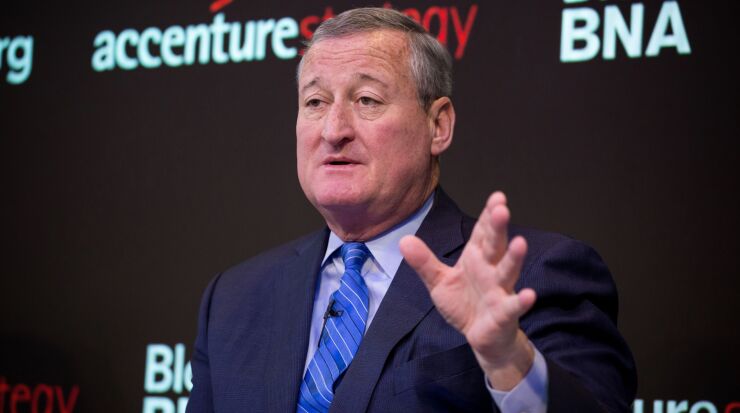Philadelphia Mayor Jim Kenney’s fifth budget proposal seeks to shield the city from a potential recession.
Kenney, who was reelected to a second term last November, pitched a $5.2 billion fiscal 2021 spending plan Thursday that would earmark $56.7 million into the city’s Recession Reserve and make a $36.5 million Rainy Day fund deposit. The Democratic mayor is also proposing to deposit $40 million into a Labor Reserve established to offset costs of new union contracts that take effect at the start of the new fiscal year on July 1, 2020.

While Philadelphia is bracing for a looming downturn, the Kennedy administration noted in budget documents that the city’s economic consultant puts the chances of recession hitting between July 1, 2020 and June 30, 2021 at a “relatively low” rate of 25%. City officials stressed though that the economic forecast was created prior to concerns about how COVID-19 is impacting the stock market.
Kenney laid the groundwork
“These moves to set funds aside is a very prudent decision and shows good fiscal austerity,” said Villanova University School of Business professor David Fiorenza. “The city is wise to take all the necessary steps to face any shocks to the economy, such as the coronavirus. Some sectors of the Philadelphia economy, such as tourism and hospitality, will contract for a few months.”
The last U.S. recession that lasted from December 2007 to June 2009 hit Philadelphia finances especially hard with the city’s fund balance not reaching pre-2008 levels until 2018. Kenney is projecting a 2021 fund balance of $316 million, which would make up about 6% of planned spending. This meets the low end of Philadelphia’s surplus goal of 6% to 8%, but the city is still far below the Government Finance Officer Association’s recommended 17% median fund balance for the 25 largest U.S. cities.
The proposed budget, which Kenney outlined before the city council, would allocate $760 million toward pension funding, a 1.4% increase from the current budget. Philadelphia’s pension system is now 49.6% funded compared to just 43% in 2017. The Kenney administration has focused efforts on
The Kenney administration is forecasting a 3.4% increase, or $168 million, in tax revenue for 2021. Total tax collections are estimated at $3.86 billion plus an additional $551 million from the Pennsylvania Intergovernmental Cooperation Authority city account that features a portion of the wage tax not needed to pay debt service. PICA was established in 1991 to provide financial assistance to Philadelphia while it tackled a severe financial crisis.
Philadelphia’s expected revenue and surplus boost enabled Kenney to propose $118 million in increased spending in the budget compared to current fiscal 2020 projections. The mayor’s largest proposed spending increase is an extra $45 million for the Philadelphia School District, which city officials said will offset a lack of real estate tax growth earmarked for public schools due to using 2020 property assessments for another year. The city
Philadelphia’s general obligation bonds are rated A-minus by Fitch Ratings, A by S&P Global Ratings and A2 by Moody’s Investors Service. Fitch assigns a positive credit outlook while Moody’s and S&P have the city at stable.





